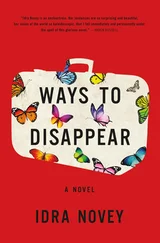“The doctor said Dad’s innocent!”
On the phone, it sounds as if Niklas is surrounded by friends speaking in loud voices. Apparently, his meeting of the social committee for the gymnasium isn’t over yet. He speaks in a low voice, his mouth pressed to the receiver. “But wasn’t it going to be in a few weeks that they—”
“Yes, this wasn’t the actual psychiatric report for the court case, but the examination that the Medico-Legal Council will use to make the report. It’s a step on the way — a huge step! And Dad was much more himself today too. I think you should stay home tonight so we can celebrate.”
Silence.
And then his voice, still almost a whisper: “Do I have to?”
“No, you don’t have to, Niklas. But this could be one of the most important days of our lives. Shouldn’t we spend it together?”
“But it’s not today that’s the most important day, is it? You just said that it isn’t until—”
“But maybe today’s the day that decides it. Maybe it’s the day that determines that Dad’s innocent!”
“Then of course I’ll come home. I will. We ought to …” I can hear from his tone that he’s changing his mind again as he speaks. “But you did just say it isn’t the actual report. It’s only maybe … And besides, all of us who did something for the spring concert were going to meet tonight.”
“So you’ll just have to cancel your plans and celebrate with your mother and father. This is something worth commemorating.”
After we’ve hung up I call Bernard, but he’s in court. I must sound a bit silly in the message I leave on his phone, yet if Frederik can be as well as I saw today, anything is possible. Then I ring up my in-laws, Helena, and some of the others in the support group. They all sound happy for my sake. I feel so exuberant I even leave a message on my mother’s voice mail.
It feels wrong to force Niklas to stay home, so I’ll make an extra effort to ensure that his evening with us is a special one. After driving Frederik home, I shop for Niklas’s favorite meal: large steaks and then chocolate macaroon meringue from an old fattening recipe of Vibeke’s. We agreed that he’d be home at seven. I start waking Frederik half an hour before and try to get him into some festive clothes.
It’s seven thirty when Niklas shows up, but I don’t mention the time. I serve virgin cocktails in the living room, and I almost feel like clanging a spoon on my glass and making a speech. We’ve won two major victories today in the struggle for Frederik’s health and freedom.
But Niklas is grumpy. I try to get him to laugh, I compliment him, ask how he’s doing, fill up his glass; apologize for pressing him to stay home. And I explain once more that since a family’s forced to weather the worst times together, it’s important we remember to enjoy the best times together too.
Maybe he’s trying to be nice — because surely he can see all I’ve put into the evening, with the fine cloth and the silver candlesticks on the table. But he doesn’t succeed. I wonder if there might be something wrong between him and Emilie, but I know it’s not worth asking. Are they girlfriend and boyfriend now? Have they quarreled? Instead, I ask how his committee meeting went, and I tell him about the other patients in the waiting room today, trying to make it as funny as I can.
In the end, I say I’ll leave the two men by themselves in the living room for a few minutes while I see to the last things in the kitchen. In truth, I don’t need to do anything except broil the steaks, but once in a while Niklas has more fun being alone with his dad.
It seems to work. From the kitchen, I can hear them talking about some boxing clips they’ve seen on YouTube. A week ago, Frederik suddenly stopped being interested in motor sports. Now he’s into boxing, and he gets annoyed if someone starts talking to him about race drivers.
When we’ve seated ourselves at the table, Frederik wolfs down his steak in a couple of minutes — that’s how he eats when he’s tired. As soon as he finishes, he gets up and walks away without a word. I could shout after him, but nothing good usually comes of that.
I wonder if Niklas is going to say, When he leaves, I leave too . I prepare myself to answer him, but he doesn’t say it. Yet my brain keeps coming up with needless reasons for why he shouldn’t go. It won’t stop picturing our argument.
We have a standing agreement that dinners are to be cell-free, but his phone emits a TEXT RECEIVED beep and he starts tapping out a reply.
He’s managed to keep me at a distance from Emilie since I called her Sara out on the street, yet I imagine all kinds of things about her. At night before I fall asleep, I wonder what she’s like. She must be gifted since Niklas is in love with her, and she must like the sort of art films that Niklas and Mathias do. Yet she doesn’t take photos, she said, and she doesn’t make sound collages or music like Mathias. Other than that, I don’t know anything about her except what I’ve nosed out online: that during her first year of gymnasium, she was already on the editorial staff of the school paper, and that she’s written a good article about a school in Burma that their student charity supports, as well as three short poems about her best childhood friend, who developed multiple sclerosis.
Sometimes at night when I’m dozing, I confuse her with the beautiful pale long-haired girls from my time in gymnasium. If she’s a poet, she must also be sad and alone at times; maybe she has a difficult relationship with her parents, maybe I could be the kind of mother neither of us has had. And again I think of the children — the ones I lost after Niklas. Daughters, sons, siblings. The tumor we had instead.
“Why doesn’t Emilie come over tonight?” I ask. “It’d be really nice if she did.”
Something detonates overhead. We both start but remain seated, even though it feels like the house and the whole street continue to shake. Frederik’s managed to knock over one of his great big sheets of high-density fiberboard again, onto the floor of the workshop directly above us.
“I think it’s fun that you and Bernard are interested in the same photographers,” I say. “He’s got a book on Denis Darzacq that I borrowed. I thought we might look through it together. Then I can hear what you think about it, as a photographer.”
Niklas isn’t interested. And I thought I was so clever bringing the book home.
The ceiling booms above us again. I can’t understand why Frederik can’t see that the sheets will fall over. Niklas is texting again, and I slowly compose myself to say what I’m about to say. I’m sure he doesn’t notice anything, since it was already quiet here before.
When I see that he’s clicked SEND, I take a deep breath and say, “Niklas?”
“Yeah.”
“I’ve been thinking a lot about something.”
“Mm-hmm.”
“I think that we need to talk about our anger.”
“What anger?”
“The anger we’ve been feeling.”
“I don’t feel angry.”
“I was hoping you wouldn’t say that.”
“I’m not angry!”
“Listen to yourself. You’re shouting at me.”
“God damn it, Mom!”
“It’s okay to be angry. I’m angry too. In fact I’m furious about everything. Both of us have a great deal to be angry about.”
“Aarghh!”
“It just shouldn’t come between us. It doesn’t have to come between us. That’s too sad, all too sad.”
He sighs loudly and stares down at the table. “I’d really like to go to that meeting tonight.”
“Do you think I like to talk about this? Do you?”
Niklas’s voice grows calm again, and for a moment he’s the old Niklas. “No.”
Читать дальше



![Ally Carter - [Gallagher Girls 01] I'd Tell You I Love You But Then I'd Have to Kill You](/books/262179/ally-carter-gallagher-girls-01-i-d-tell-you-i-lo-thumb.webp)








